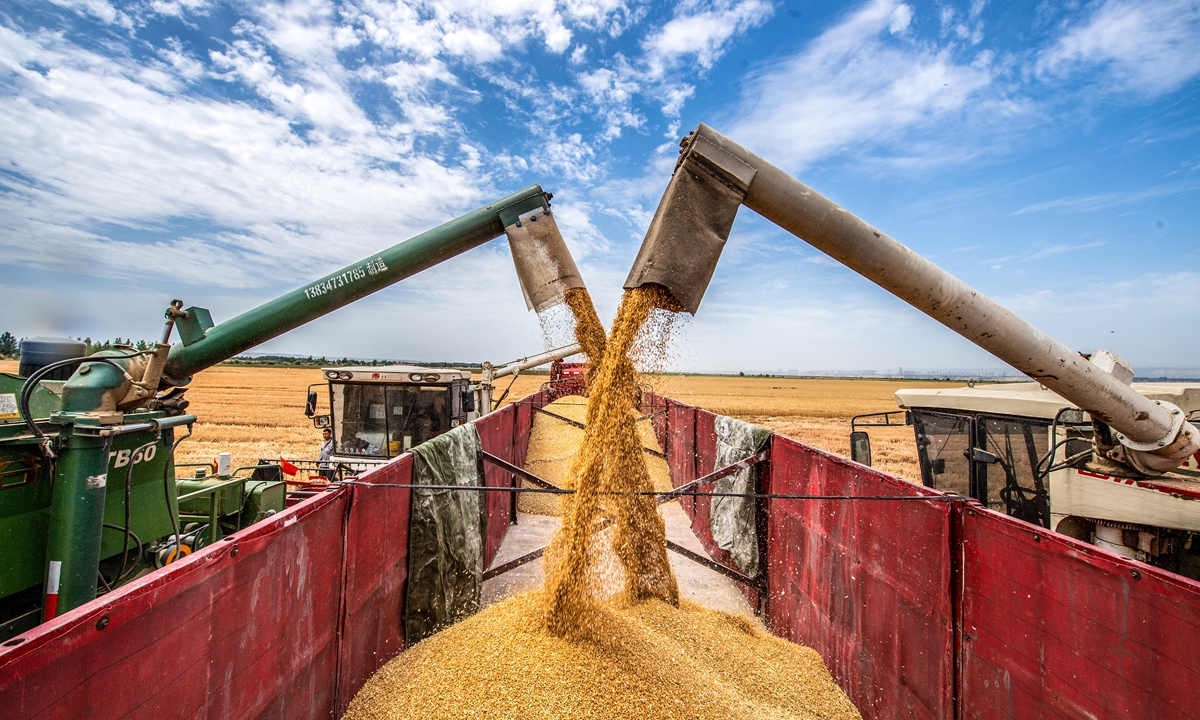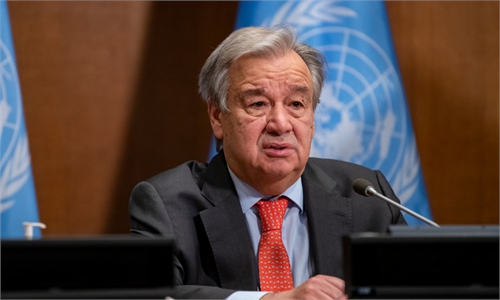
Photo: VCG
The ongoing Ukraine crisis has catapulted global food security to the top of the headlines, because both Russia and Ukraine used to be important food exporters. Concerned about impending food shortages, some countries like India are blocking wheat exports, adding to supply pressures. The number of undernourished people in the world grew from 640 million in 2019 to an estimated 810 million now, so it is significant to enhance grain production and ensure food security.
During a ministerial meeting on global hunger taking place at UN Headquarters in New York earlier this month, UN Secretary General Antonio Guterres said the number of severely food insecure people had doubled in just two years - from 135 million pre-pandemic to 276 million today, with more than half a million experiencing famine - an increase of more than 500 per cent since 2016.
Guterres called on all governments to "act together, urgently and with solidarity" to end the impending crisis linked to food shortage and growing insecurity.
Prices of staple crops, such as wheat, corn and rice, are surging. The Covid-19 pandemic, particularly the highly infectious Omicron variant, is making the food supply crunch even more acute. If the international community refuses to sit down and seek a solution, more people in the less developed continents, such as Africa, will starve in the coming months.
The latest Food Price Index, released by the Food and Agriculture Organization of the United Nations (FAO) revealed that global food prices are 34 percent higher last month compared with the same period of 2021. They have never been this high since the international food organization started recording them.
It is hoped by the whole world that the conflict between Russia and Ukraine could come to an end as soon as possible.
If the conflict continues, the impacts on the capacity of both Ukraine and Russia to produce, harvest and export food products, will be increasingly felt around the world, which will inevitably lead to spiraling food prices, driving more people to struggle with insufficient access to food .
Ukraine and Russia produce almost a third of the world's wheat and barley and half of its sunflower oil. More than 50 countries in the world depend on Ukraine and Russia for over 30 percent of their wheat imports; the Middle East and Africa import more than half of their cereal supplies from these two countries. Russia and Belarus are the world's number two and three producers of potash, a key ingredient in fertilizer.
Facing the challenge, major grain producing countries should reduce market pressure by increasing food supplies, removing their restrictions imposed on exports and making their surpluses available to those most in need in the world.
And it is also imperative to pay enhanced importance to food security in China with 1.4 billion people. For many years, China has maintained a high level of food self-sufficiency and the country also has high levels of food reserves. But the Ukraine crisis' impact will be felt by China, too, as Russia and Ukraine are both important sources of agricultural products for China. For instance, China imported 70 percent of its sunflower oil, and 30 percent of corn from Ukraine last year.
Ever since 2000, China has made outstanding attainments in ensuring food security. Thanks to the country's vigorous investment on agricultural modernization, cereal production has more than doubled in the fast 40 years, with per capita grain and meat output significantly improved.
In fact, China's food production has been relatively high compared with other major economies. Food stocks are well above the minimum level recommend by the FAO, and this country has maintained an overall 95 percent food self-sufficiency level over the past 10 years.
However, the increasingly volatile international situation, worldwide inflation, and in particular, the lingering coronavirus resurgences and flare-ups, will continue to exert grain production and supply pressure on China.
A recent World Bank report has warned that, in a downside scenario, China's economic growth could be as low as 4.0 percent this year -- against a target of 5.5 percent set by the government. Since, as always, the poorest and the most vulnerable will be the most affected, it is important for the government to expand the social safety net in order to protect and support the vulnerable groups.
Just as UN Secretary General Guterres remarked, if the world "acts together", there will be enough food for everyone and "ending hunger is within our reach".
The author is an editor with the Global Times. bizopinion@globaltimes.com.cn


